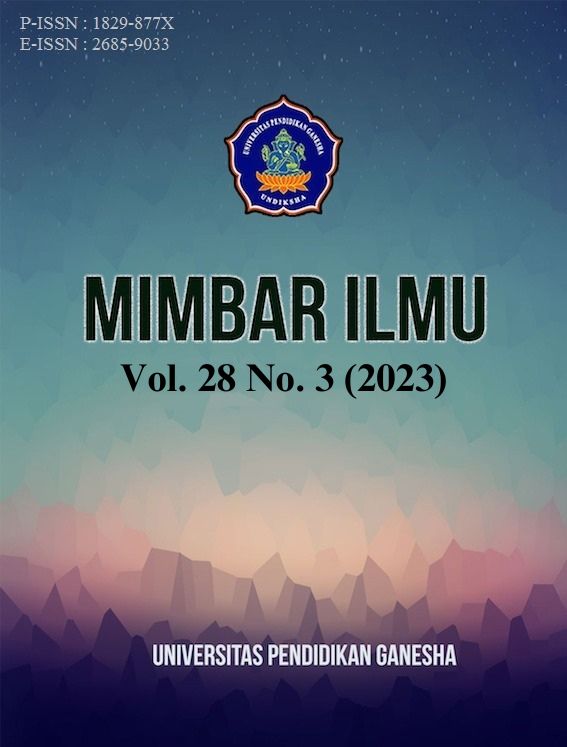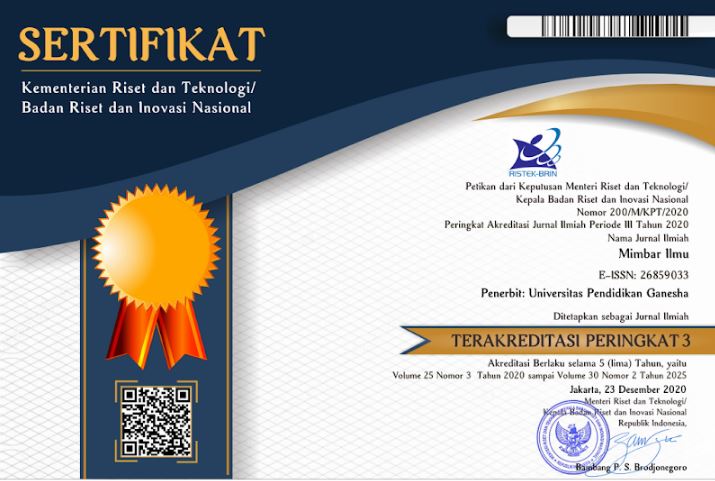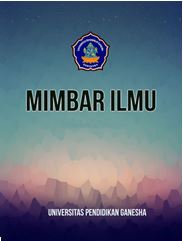Evaluation of Sport Psychology Knowledge of Coaches at the Buleleng Volleyball Academy (ABVB)
DOI:
https://doi.org/10.23887/mi.v28i3.60467Kata Kunci:
Knowledge, Trainer, Sports PsychologyAbstrak
Currently, the program contained in the training periodization focuses on physical training programs, techniques, and tactics for playing volleyball. However, the psychological condition is to blame if an athlete's performance fails. The generational difference between coaches and athletes greatly disrupts interactions, so a unique approach is needed that touches the psychological side of athletes in providing training and improving performance. This research aims to describe the level of understanding of coaches at the Buleleng Volleyball Academy (ABVB) regarding the psychology program of training periodization. This research is a descriptive analysis research, with 12 ABVB trainers as research subjects. Data were collected through observation and survey techniques with research instruments using two questionnaires. The first questionnaire determines the role of psychology in sports, and the second examines the coach's ability to implement psychology in training programs. Data analysis with data triangulation. This research was carried out during the Covid-19 pandemic, so it was carried out via Google Forms. The research results show that coaches understand the role of sports psychology but need to learn the form of training given to athletes. The conclusion is that ABVB coaches own sport psychology knowledge but have yet to apply it in handling athletes, so strengthening is needed to make coaches better at using it in training.
Referensi
Afifah, R. N., Syaodih, E., Setiasih, O., Suhandi, A., Maftuh, B., Hermita, N., Samsudin, A., & Handayani, H. (2019). An early childhood teachers teaching ability in project based science learning: A case on visible light. Journal of Physics: Conference Series, 1157(2). https://doi.org/10.1088/1742-6596/1157/2/022049. DOI: https://doi.org/10.1088/1742-6596/1157/2/022049
Amansyah, A. (2019). Dasar Dasar Latihan Dalam Kepelatihan Olahraga. Jurnal Prestasi, 3(5), 42. https://doi.org/10.24114/jp.v3i5.13448. DOI: https://doi.org/10.24114/jp.v3i5.13448
Arwin, A., Pramadanita, A., Nopiyanto, Y. E., Prabowo, A., Raibowo, S., Kardi, I. S., & Ibrahim, I. (2023). Analisis Tingkat Kecemasan Peserta Ekstrakurikuler Bola Voli Di SMA Negeri 3 Seluma. Jambura Health and Sport Journal, 5(2), 153–160. https://doi.org/10.37311/jhsj.v5i2.21168. DOI: https://doi.org/10.37311/jhsj.v5i2.21168
Bell, A. F., Knight, C. J., Lovett, V. E., & Shearer, C. (2022). Understanding elite youth athletes’ knowledge and perceptions of sport psychology. Journal of Applied Sport Psychology, 34(1), 155–177. https://doi.org/10.1080/10413200.2020.1719556. DOI: https://doi.org/10.1080/10413200.2020.1719556
Caruzzo, N. M., Vissoci, J. R. N., Contreira, A. R., Caruzzo, A. M., & Fiorese, L. (2021). Leadership, mental toughness, and attachment relationship in the world beach volleyball context. Sustainability (Switzerland), 13(19), 1–12. https://doi.org/10.3390/su131910748. DOI: https://doi.org/10.3390/su131910748
Cropley, B., Thelwell, R., Mallett, C. J., & Dieffenbach, K. (2020). A Commentary and Reflection on Sport Psychology in the Discipline of Sports Coaching. Journal of Applied Sport Psychology, 32(1), 121–128. https://doi.org/10.1080/10413200.2019.1695690. DOI: https://doi.org/10.1080/10413200.2019.1695690
Erdiyanti, Y. P., & Maulana, A. (2019). Hubungan Kecemasan dengan Performa Atlet Bola Voli pada Event Kejuaraan Antar Desa Di Desa Orimalang Kec. Jamblang Kab. Cirebon. Prophetic : Professional, Empathy and Islamic Counseling Journal, 2(2), 269. https://doi.org/10.24235/prophetic.v2i2.5813. DOI: https://doi.org/10.24235/prophetic.v2i2.5813
Fadhli, N. R. (2021). Performa Smash Bola Voli Dalam Event Liga Mahasiswa Ditinjau Dari Antropometri Dan Pengalaman Bertanding. JSES : Journal of Sport and Exercise Science, 4(1), 1–10. https://doi.org/10.26740/jses.v4n1.p1-10. DOI: https://doi.org/10.26740/jses.v4n1.p1-10
Ferrar, P., Hosea, L., Henson, M., Dubina, N., Krueger, G., Staff, J., & Gilbert, W. (2018). Building High Performing Coach-Athlete Relationships: The USOC’s National Team Coach Leadership Education Program (NTCLEP). International Sport Coaching Journal, 5(1), 60–70. https://doi.org/10.1123/iscj.2017-0102. DOI: https://doi.org/10.1123/iscj.2017-0102
Guntoro, T. S., Kurdi, K., & Putra, M. F. P. (2020). Karakter kepribadian atlet Papua: kajian menuju POPNAS ke-XV. Jurnal SPORTIF : Jurnal Penelitian Pembelajaran, 6(1), 40–58. https://doi.org/10.29407/js_unpgri.v6i1.13638. DOI: https://doi.org/10.29407/js_unpgri.v6i1.13638
Hashim, J. M., & Noor, M. A. M. (2020). Knowledge Assessment And Application Psychological Skills Training (PST) In the Co-Curricular Trainer of the Malaysian Teacher Education Institute. Jurnal MensSana, 5(1), 53. https://doi.org/10.24036/jm.v5i1.135. DOI: https://doi.org/10.24036/jm.v5i1.135
He, C., Trudel, P., & Culver, D. M. (2018). Actual and ideal sources of coaching knowledge of elite Chinese coaches. International Journal of Sports Science and Coaching, 13(4), 496–507. https://doi.org/10.1177/1747954117753727. DOI: https://doi.org/10.1177/1747954117753727
Henriksen, K., Schinke, R., McCann, S., Durand-Bush, N., Moesch, K., Parham, W. D., Larsen, C. H., Cogan, K., Donaldson, A., Poczwardowski, A., Noce, F., & Hunziker, J. (2020). Athlete mental health in the Olympic/Paralympic quadrennium: a multi-societal consensus statement. International Journal of Sport and Exercise Psychology, 18(3), 391–408. https://doi.org/10.1080/1612197X.2020.1746379. DOI: https://doi.org/10.1080/1612197X.2020.1746379
Jarwo, S. (2022). Pengetahuan Atlet tentang Self Talk sebagai salah satu solusi mengatasi tekanan dalam Permainan Bola Voli. Jurnal Patriot, 4(2), 117–122. https://doi.org/10.24036/patriot.v4i2.829. DOI: https://doi.org/10.24036/patriot.v4i2.829
Kim, Y., & Park, I. (2020). “Coach Really Knew What I Needed and Understood Me Well as a Person”: Effective Communication Acts in Coach–Athlete Interactions among Korean Olympic Archers. International Journal of Environmental Research and Public Health, 17(9), 3101. https://doi.org/10.3390/ijerph17093101. DOI: https://doi.org/10.3390/ijerph17093101
Leeder, T. (2019). Learning to mentor in sports coaching: a design thinking approach. Sport, Education and Society, 24(2), 208–211. https://doi.org/10.1080/13573322.2018.1563403. DOI: https://doi.org/10.1080/13573322.2018.1563403
Lisinskiene, A. (2018). The effect of a 6-month coach educational program on strengthening coach-athlete interpersonal relationships in individual youth sport. Sports, 6(3). https://doi.org/10.3390/sports6030074. DOI: https://doi.org/10.3390/sports6030074
Mujika, I., Halson, S., Burke, L. M., Balagué, G., & Farrow, D. (2018). An integrated, multifactorial approach to periodization for optimal performance in individual and team sports. International Journal of Sports Physiology and Performance, 13(5), 538–561. https://doi.org/10.1123/ijspp.2018-0093. DOI: https://doi.org/10.1123/ijspp.2018-0093
Murni, S., Galih Dwi Pradipta, & Pandu Kresnapati. (2020). Tingkat Keprcayaan Diri Atlet Bola Voli Club Tugu Muda Semarang Dalam Bertanding Event Kejuaraan Antar Club Di Kabupaten Jepara. STAND : Journal Sports Teaching and Development, 1(2), 94–103. https://doi.org/10.36456/j-stand.v1i2.2738. DOI: https://doi.org/10.36456/j-stand.v1i2.2738
Nailufar, N., & Hartono, M. (2022). Manajemen Pembinaan Prestasi Klub Bola Voli Mitra Kencana Semarang Tahun 2021. Indonesian Journal for Physical Education and Sport, 3(1), 311–317. https://doi.org/10.15294/inapes.v3i1.48030. DOI: https://doi.org/10.15294/inapes.v3i1.48030
Negara, F. B., Yarmani, Y., & Nopiyanto, Y. E. (2021). Pengetahuan Psikologi Olahraga Pada Pelatih Renang dengan Prestasi Atlet Renang Di Rejang Lebong. Sport Gymnastics : Jurnal Ilmiah Pendidikan Jasmani, 2(2), 228–239. https://doi.org/10.33369/gymnastics.v2i2.16196. DOI: https://doi.org/10.33369/gymnastics.v2i2.16196
Nopiyanto, Y. E., Alexon, A., Raibowo, S., Prabowo, A., Ilahi, B. R., & Widodo, L. (2022). Pengaruh Latihan Imagery terhadap Kepercayaan Diri Atlet. Jurnal Patriot, 4(1), 48–57. https://doi.org/10.24036/patriot.v4i1.834. DOI: https://doi.org/10.24036/patriot.v4i1.834
Otte, F. W. (2020). When and How to Provide Feedback and Instructions to Athletes?—How Sport Psychology and Pedagogy Insights Can Improve Coaching Interventions to Enhance Self-Regulation in Training. Frontiers in Psychology, 11. https://doi.org/10.3389/fpsyg.2020.01444. DOI: https://doi.org/10.3389/fpsyg.2020.01444
Permana, A., Syamsul Taufik, M., Hidayat Suharto, T., Rahmat, A., Usmaedi, Arini, I., & Arini, I. (2022). Analisis Karakteristik Psikologi Kepribadian Atlet Bola Voli Kabupaten Cianjur Menuju PORDA Memasuki Tahun 2021. Jurnal Segar, 11(1), 37–46. https://doi.org/10.21009/segar/1101.06. DOI: https://doi.org/10.21009/segar/1101.06
Pulungan, K. A., & Dimyati, D. (2019). The psychological skill characteristics of Indonesian volleyball players reviewed based on gender and position. Jurnal Sportif : Jurnal Penelitian Pembelajaran, 5(2), 279. https://doi.org/10.29407/js_unpgri.v5i2.13178. DOI: https://doi.org/10.29407/js_unpgri.v5i2.13178
Ramli, A. C. (2021). Studi Kondisi Fisik Pemain Bola Voli pada Club IKTLVB Kabupaten Flores Timur. Riyadhoh : Jurnal Pendidikan Olahraga, 4(1), 108. https://doi.org/10.31602/rjpo.v4i1.4281. DOI: https://doi.org/10.31602/rjpo.v4i1.4281
Rohendi, A., Budiman, A., & Cipta, M. G. (2021). Hubungan antara Kecemasan dan Motivasi dengan Prestasi Atlet Bola Voli di Masa Pandemi Covid-19. JPOE, 3(1), 34–41. https://doi.org/10.37742/jpoe.v3i1.108. DOI: https://doi.org/10.37742/jpoe.v3i1.108
Siekanska, M., & Wojtowicz, A. (2020). Impulsive athlete as a self-regulated learner. Can self-confidence and a positive social attitude change a developmental inhibitor into a growth catalyst? Journal of Physical Education and Sport, 20(2), 623–629. https://doi.org/10.7752/jpes.2020.02091. DOI: https://doi.org/10.7752/jpes.2020.02091
Silva, A. S., Barreiros, A., & Fonseca, A. M. (2019). Exploring the importance of coaches in the development of the sports career in Handball. The perception of athletes from higher and lower levels of success. Cuadernos de Psicologia Del Deporte, 19(1), 106–120. https://doi.org/10.6018/cpd.314221. DOI: https://doi.org/10.6018/cpd.314221
Stone, J. A., Rothwell, M., Shuttleworth, R., & Davids, K. (2021). Exploring sports coaches’ experiences of using a contemporary pedagogical approach to coaching: an international perspective. Qualitative Research in Sport, Exercise and Health, 13(4), 639–657. https://doi.org/10.1080/2159676X.2020.1765194. DOI: https://doi.org/10.1080/2159676X.2020.1765194
Sudhen, M. L. S., Hengki Kumbara, & Ramanata Disurya. (2023). Efektivitas Rational Emotive Therapy untuk Mengurangi Kecemasan Menjelang Bertanding pada Siswa Ekstrakurikuler Bola Voli SMA Negeri 1 Belitang II. SPRINTER: Jurnal Ilmu Olahraga, 4(2), 151–156. https://doi.org/10.46838/spr.v4i2.330. DOI: https://doi.org/10.46838/spr.v4i2.330
Sujarwo, S. (2021). Sosialisasi Aspek Psikologis yang harus dimiliki oleh Atlet dan Pelatih Bola voli. Altruis: Journal of Community Services, 2(1). https://doi.org/10.22219/altruis.v2i1.15531. DOI: https://doi.org/10.22219/altruis.v2i1.15531
Sujarwo, S., & Margono, M. (2023). Tingkat pengetahuan wasit bolavoli tentang filosofi dan perannya dalam suatu pertandingan. Jurnal Porkes, 6(1), 38–49. https://doi.org/10.29408/porkes.v6i1.12276. DOI: https://doi.org/10.29408/porkes.v6i1.12276
Sulistyowati, L. P., & Irsyada, R. (2022). Pengaruh Pemberian Gymnastic Exercise Terhadap. Indonesian Journal for Physical Education and Sport, 3(2), 348–355. https://doi.org/10.15294/inapes.v3i2. DOI: https://doi.org/10.15294/inapes.v3i2.60892
Triananda, A., Syafrial, S., & Nopiyanto, Y. E. (2021). Karakteristik Psikologis Atlet PON Bengkulu ditinjau dari Cabang Olahraga Individu. Sport Gymnastics : Jurnal Ilmiah Pendidikan Jasmani, 2(1), 126–137. https://doi.org/10.33369/gymnastics.v2i1.14862. DOI: https://doi.org/10.33369/gymnastics.v2i1.14862
Turnnidge, J., & Côté, J. (2017). Transformational Coaching Workshop: Applying a Person-Centred Approach to Coach Development Programs. International Sport Coaching Journal, 4(3), 314–325. https://doi.org/10.1123/iscj.2017-0046. DOI: https://doi.org/10.1123/iscj.2017-0046
Waters, A., Phillips, E., Panchuk, D., & Dawson, A. (2019). The coach–scientist relationship in high-performance sport: Biomechanics and sprint coaches. International Journal of Sports Science and Coaching, 14(5), 617–628. https://doi.org/10.1177/1747954119859100. DOI: https://doi.org/10.1177/1747954119859100
Wekesser, M. M., Harris, B. S., Langdon, J., & Wilson, C. H. (2021). Coaches’ impact on youth athletes’ intentions to continue sport participation: The mediational influence of the coach–athlete relationship. International Journal of Sports Science and Coaching, 16(3), 490–499. https://doi.org/10.1177/1747954121991817. DOI: https://doi.org/10.1177/1747954121991817
Wilczyńska, D., Walczak-Kozłowska, T., Alarcón, D., Zakrzewska, D., & Jaenes, J. C. (2022). Dimensions of Athlete-Coach Relationship and Sport Anxiety as Predictors of the Changes in Psychomotor and Motivational Welfare of Child Athletes after the Implementation of the Psychological Workshops for Coaches. International Journal of Environmental Research and Public Health, 19(6). https://doi.org/10.3390/ijerph19063462. DOI: https://doi.org/10.3390/ijerph19063462
Unduhan
Diterbitkan
Cara Mengutip
Terbitan
Bagian
Lisensi
Hak Cipta (c) 2023 I Gede suwiwa

Artikel ini berlisensiCreative Commons Attribution-ShareAlike 4.0 International License.
This work is licensed under a Creative Commons Attribution-ShareAlike 4.0 International License.
Authors who publish with this journal agree to the following terms:
- Authors retain copyright and grant the journal right of first publication with the work simultaneously licensed under a Creative Commons Attribution License that allows others to share the work with an acknowledgment of the work's authorship and initial publication in this journal.
- Authors are able to enter into separate, additional contractual arrangements for the non-exclusive distribution of the journal's published version of the work (e.g., post it to an institutional repository or publish it in a book), with an acknowledgment of its initial publication in this journal.
- Authors are permitted and encouraged to post their work online (e.g., in institutional repositories or on their website) prior to and during the submission process, as it can lead to productive exchanges, as well as earlier and greater citation of published work.









